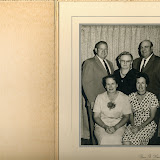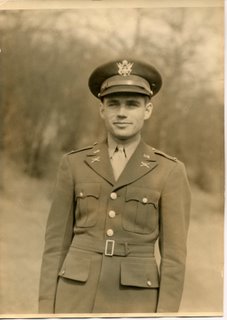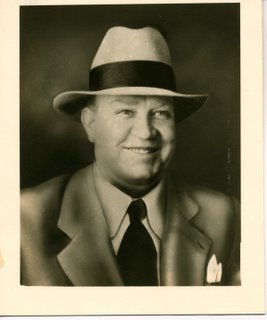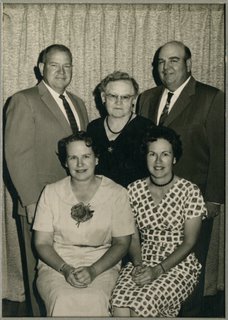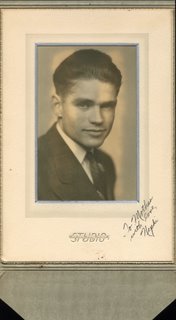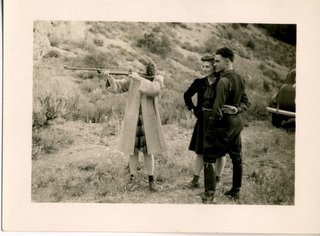Wednesday, July 18, 2007
Collaborative Family History
Saturday, November 04, 2006
Gedcom Available
Collaboration
Sunday, August 20, 2006
Sunday, December 18, 2005
Family Photos
Sunday, October 02, 2005
Laura and Adelbert's Third Child?
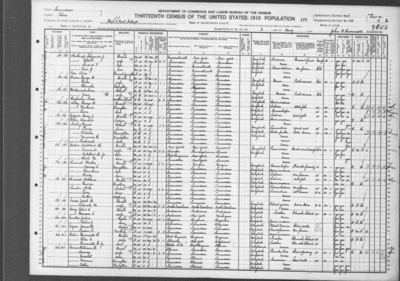 According to the 1910 U.S. census, Adelbert K. Baker and Laura A. Baker had 3 children but only 2 were living at that time. We know that they were married for 10 years by 1910 according to the census. Finding the third child could be fun project because doing so would allow us to seal their whole family together.
According to the 1910 U.S. census, Adelbert K. Baker and Laura A. Baker had 3 children but only 2 were living at that time. We know that they were married for 10 years by 1910 according to the census. Finding the third child could be fun project because doing so would allow us to seal their whole family together.
William Walton Burton
Baptized in
In April 1851 he was ordained an elder and appointed to travel in the
For nearly a year I could see but little success attending my labors. In the meantime, a young man had been sent to labor with me, but he became discouraged, went home and left me alone again. Some of those who had been friendly, became prejudiced against me, through slanderous stories circulated by ministers, and almost every door that had been opened was now closed.
While in this condition, I took shelter, one cold wet day (and I had the tooth ache at the time), [350] under a tree, and offered a most earnest prayer, that the Lord would open my way before me, help me to live acceptably before him, and crown my efforts with success. The Lord answered my prayer, for it was not long before I had many friends and all the places opened to preach in that I could attend to.
About this time ministers of six denominations in Knaresborough sent for one John Theobold, a lecturer and author of slanderous works against us, to come and help them put down "Mormonism." On his arrival, he gave five lectures and issued a challenge to meet any of the leaders of our Church in discussion.
The president of the Bradford conference reported our condition to the presidency of the British mission, and asked counsel as to what would be best for us to do; word came to the effect that in our case it would be best to accept the challenge for discussion and that I was the one to meet Mr. Theobold. As other and more experienced Elders were within reach, I had not expected this; however, I resolved to obey, trust in the Lord and do my best.
This was in 1852, and during the week that the discussion was pending the revelation on plural marriage was first published in the "Millennial Star."
Five nights' discussion was held. The Lord was with us. Our friends increased every day, and soon after the debate was over, we had a branch at Knaresborough of thirty-eight members and another branch at Skelton, about eight miles from there, of eight members.
One night, while trying to find my way through some fields, to a place where I expected to lodge, I lost my way, and having no overcoat I walked to keep warm. I was quite absorbed in thought, thinking how much the Elders were trying to do for the world and how little their efforts were appreciated. Suddenly I stopped, without knowing why. Having a cane in my hand, I instinctively put it before me and found no bottom. I then remembered that somewhere in the fields there was a deep stone quarry. I turned around, felt my way with my cane, and a few rods away found a road. I knew where I was and that this was the stone quarry.
John Cummings, of Skelton, was my friend from the first time we met. He invited me to make my home with him, when in that neighborhood, and he also opened his house for me to hold meetings in. Notwithstanding all this, his wife was bitterly opposed to me and our people.
Mr. Cummings and I were sitting up late one evening conversing on the principles of the gospel, after holding meetings there for some months, when Mrs. Cummings said: "I had a strange dream last night. I thought that I was walking along a road and that Mr. Burton was there. He ran after me, and caught me."
I answered, "The interpretation of that dream is that I shall soon baptize you." Her response was: "No, never, you will never baptize me, for I shall never join your Church." She seemed so positive that I felt that perhaps I had said too much.
About two weeks afterwards I had an appointment to hold meeting at Langthorpe, two or three miles away. It was rumored that a Baptist minster had said that he would be there and expose "Mormonism." Mrs. Cummings was induced to walk that distance to hear us exposed. The minister was not there, but that night Mrs. Cummings was convinced of the truth. I was invited to go home with them. Mrs. Cummings scarcely said a word all the way home.
When we entered the house, it was nearly midnight. She sat down and seemed to be very thoughtful. Her husband turned to her and said, "Hannah, why don't you take your things off?" She responded "John, are you ready to be baptized tonight." He answered, "No, not quite ready tonight."
But she said that she could not sleep, if not baptized that night; and, turning to me, she said, "Mr. Burton, will you baptize me tonight?" I answered, "Yes, if your husband will go with us." He assented, and though it was midnight, and the winds were whistling through the trees, we started off down to the river, about two miles away, and I baptized her, fulfilling the interpretation to her dream to the very letter.
Feb. 22, 1854, I sailed on the ship "Windermere" from Liverpool for
It was early in the morning; a fast was decided upon, and prayer meeting held at 10 a.m. The storm abated a little—enough, to make us feel out of danger—but continued in considerable force till the 18th. On the 14th (March) smallpox broke out. There were forty cases on board and thirteen funerals took place between Liverpool and
We had no new cases of small pox after leaving
We arrived at
March 28, 1856, I married Rachel Fielding. During 1862, 1863 and 1864 I taught school in Kaysville,
For many years, and up to 1882, I served as a member of the city council. In the latter year I resigned. I also served many years as a member of the High Council of Weber Stake and up to my leaving there for
"As the land disappeared in the distance, the sweet singing ceased and many began to feel ill. About 8 p.m. the first day at sea, an old gentleman named Squires died. All that night the wind howled fiercely; the sea was rough and the ship was driven off its course toward the Isle of Atan. About 11 p.m., Holly Head, which is the most dangerous point and the scene of frequent shipwrecks, was passed. On the following morning, February 23rd, the body of Philip Squires was lowered into the sea.
On the 12th day of March, from 7 to 8 a.m., an exceedingly fierce storm arose. The masts cracked andmany of the sails were cut in pieces. The Captain of the Windermere [sic], Captain Fairfield, expressed fears that the ship could not stand so heavy a sea. In speaking with Daniel Garn, President of the Saints on board, he said: "I’m afraid the ship cannot stand this storm, Mr. Garn. If there be a God, as your people say there is, you had better talk to Him – if He will hear you. I have done all that I can for the ship and I’m afraid that with all that can be done, she will go down."
Elder Garn went to the Elders who presided over the nine Wards on the ship and requested them to get all the Saints on board to fast and call a prayer meeting to be held in each Ward at 10 a.m., to pray that they might be delivered from danger. The waves lashed and the storm continued in all its fury – but precisely at 10 a.m., the prayer meeting commenced and such a prayer meeting few have ever seen. The ship rolled from side to side. Large boxes which were tied with ropes under the berths broke loose. Pots, pans and kettles rolled with terrible force on each side of the vessel and great confusion prevailed for sometime as they ceased their prayers to dodge the untied boxes. This terrible storm lasted about eighteen hours – then abated a little, but it was stormy from the 8th of March until the 18th.
…Then smallpox broke out. One of the three Brooke sisters was taken down with it. She had a light attack but her two sisters contracted it also, and both died. Three days after the outbreak of smallpox, the ship took fire under the cooking galley. The cry of "Fire" ran through the vessel and there was excitement and consternation everywhere. The sailors applied water freely; all the water buckets on board were brought into use and soon the fire was under control.
On the 8th of April, a voice called out: "There is land!" There was a rush to the side of the ship to see land once more. This was the Isle of St. Domingo. On the 9th, they came in sight of the Island of Cuba. On that morning about 10 a.m., a young man named Dee died of smallpox. At the time of his death, the wind had ceased howling – not a ripple upon the water. The sea appeared bright and clear – as smooth as a sea of glass. The young man’s body was sewed up in a white blanket and at the feet was placed a heavy weight of coal. A plank was placed with one end resting in the porthole on the side of the ship and the other near the main hatchway. The body lay on the plank. The mournful tolling of the bell began. Elder McGhie made a brief address and offered a short prayer, after which the body was lowered into the sea. The ship was standing perfectly still and the body could be seen sinking into the water until it appeared no larger than a person’s hand.
On the morning of April 20th, the ship entered the mouth of the Mississippi River and arrived at New Orleans on April 23rd. The morning after, eleven persons suffering with smallpox were sent to the Luxenburg hospital, agreeable to the orders from the health officers of that port. Elder Long and five others were selected to remain in New Orleans to attend to the sick until they were sufficiently recovered to go forward. The rest of the company continued from New Orleans on board the steamboat Grand Tower, April 27th and arrived in St. Louis a few days later."
Sunday, September 25, 2005
Provo City Cemetery
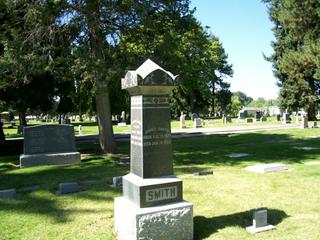
Here is the gravestone for James Smith and his 2 wives, Sarah Jane, and Christiana. The gravestone looks more recent than the 19th century, so some of their descendents may have redone his gravestone. Although Christiana Smith has a separate headstone that you can see to the right of the marker, which looks rather old.
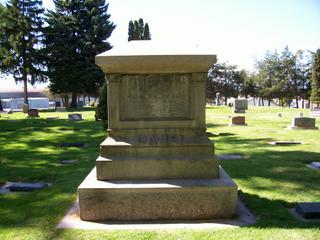
This is the gravestone for Henry William Davis and his wife Rachel Phillips Davis. The first thing that struck me was the size of the marker. It looks well-worn and is probably the original gravestone. At the bottom on the front is written "He giveth his beloved sleep". On the front are their two names, but on the back is the name of a William Ferre. I found out through Ancestral File that William Ferre was the husband of Eva Davis, a daughter of Henry W. Davis. It almost looks like more names are intended to go on the back, but none ever did. Around the stone are the graves of Henry William Davis Jr., Lottie Nelson Davis, and Lula Davis.
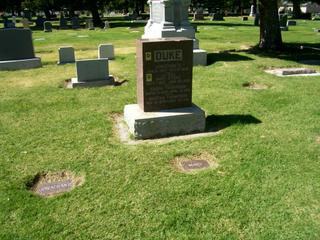
This is the grave of Jonathan O. Duke, his wives Mary Stone, Sarah Thompson, and Martha Thompson. This grave also looks recent, probably replacing the original headstone. Jonathan and Mary both have plaques indicating that they were pioneers.
Thomas and Sophia Davis are buried in the Provo City Cemetery also, but I was unable to locate them with the directions that I had. So I plan on the verifying the information and making a return trip in the future.
(Update) I was able to return to the cemetery with my mother and sister, but still wasn't able tot find the grave marker. However, we were able to talk to one of the grounds keepers who said many of the early graves don't have markers, but there is record of them among the cemetery records. It would be a fun project to find exactly were the they are buried and then put a grave marker down for them. They were first generation converts to the Church of Jesus Christ of Latter-day Saints and immigrants to the United States.
Sunday, September 18, 2005
Joseph Fielding: A Letter to Parly P. Pratt
COMMUNICATIONS
Millennial Star 2, no. 4 (Aug. 1841): 49–53. LETTER FROM JOSEPH FIELDING,
¶ Dear Brother Pratt,
¶ It is now four years since I, with six of my brethren, left America, to bear the glad tidings of the fulness of the gospel to my native land; and as I expect in a short time to return to my home, for so I may call it now, I have a desire to express my feelings and to bear my testimony to the Saints, relations, my neighbours, and the whole world, to those important things which are now agitating the nations who have heard thereof, and must shortly be heard by every ear, and penetrate every heart.
¶ But allow me, first, to look back on a few years that have gone by, for as my family have been well known in this land, the name of my parents, I feel confident, would not weaken my testimony. John and Rachel Fielding were natives of
At least fifty years he walked uprightly in the sight of all men, being an example of honesty and devotion to the world. Like Cornelius of old, he feared God with all his house, prayed to God always, and gave alms to the people to the utmost of his means; and God in his mercy, by particular applications of scriptures >, gave him promises, not as in the day of Abraham, for as there was no priesthood, and consequently no visions or prophesyings, the prophets and the seers having long been covered, and the visions of all having long been as the words of a book that is sealed, he only obtained a particular impression on his mind on an application of some promise made to the Former-Day Saints.
We often used to think that we must be in some way related to the children of Israel, because we saw the dealings or God with us resembled his dealings with them, though of course, far inferior, for the Lord did not personally visit us, neither did angels minister to us as they used to do in those days.
¶ We were in our family nine children, all of whom, I believe, and our parents, [50] were at the same time members of the same society; but for several years before the death of my father, although he had been so long and so firmly attached to the Methodist cause, while he evidently increased in the spirit, and drew nearer to God as he drew nearer his end, yet he appeared to be entirely weaned from that body; in fact, he long lamented its corrupt state. He died in peace in the 77th year of his age, on the 3rd of March, 1836; my mother also fell asleep in great peace, with a smile on her countenance, being without fault before the world, on the 13th of October, 1828, aged 61. Their virtuous lives and peaceful deaths must of course give real comfort to my mind.
I suppose if Cornelius of old had died before he heard of the Gospel, his end would likewise have been peace, indeed where there is no condemnation there must be peace, and if men live up to the light which they have, having no means of obtaining greater light, there can be no condemnation, but still this is no proof that they had the full light of the gospel. There are many Jews at this day who never believed in Jesus as the Christ, that are as righteous, and enjoy as much peace as any of the different sects of professing Christians, and they as fully believe that their sins are forgiven; and who will say that they will be for ever lost any more than those of Christendom!
¶ And when we look at the priestcraft, that awful and crowning sin of men, and often the most corrupt of men, to my certain knowledge, taking this honor to themselves, assuming the authority of the priesthood, contention, division, and wickedness of that part of the world which is called Christian, how can we wonder that the Jews have not embraced their principles; but must we then set at nought the Gospel of Christ because men have been happy and died in peace without it?
No; if so the Gospel would not need to be preached to the dead that they might be judged according to men in the flesh, &c. (see first Peter 4 & 6).
I therefore conclude that all, both Jews and Gentiles, who have been without a covenant or a true priesthood, or under a [51] broken covenant, must be judged, condemned or rewarded, on the same principle viz. according to their use or abuse of the light which they have had.
But still no one can enter the kingdom of God without the fulness of the Gospel, for the Saviour says, "Verily, Verily, I say unto thee, except a man be born of water and of the spirit he cannot enter the Kingdom of Heaven."
But God, who is rich in mercy and in wisdom, has devised means whereby his banished ones may be brought back, and those that wish to know how those who died without being born of water, &c. are to be admitted into the Kingdom, must come and obey the Gospel, the fulness of which has been restored in these last days, and they shall know the mysteries of the Kingdom of God.
¶ I would here remark to the Saints, as a caution, that many will come from the East and from the West, from the North and from the South, and shall sit down in the kingdom of God with Abraham, Isaac, and Jacob, and the children of the kingdom will be cast out; therefore let us take heed lest we who have received the fulness of the Gospel and are become the children of the kingdom, should see this scripture fulfilled upon us; where much is given much will be required.
¶ In 1832, by the providence of God, I left my native land to go to
We, as a family, had always been in the habit of reading a portion of scripture <, morning and evening, and on the morning that I with my sister bid farewell to my native place, we read as our regular lesson the 105th Psalm, and as the 17th verse was read, "He sent a man before them, even Joseph," &c. (that being my name) and taking it in connexion with our thoughts on the subject, our minds were particularly struck, and I went off as cheerfully as Lord I had been going home; the Lord was with me in all things.
I setled [sic] [51] in Upper Canada, and prospered in the things of the world better than I had ever done in my native land, though I had nothing to complain of there, for goodness and mercy have followed me all my days.
After I had been there about three years, I with my two sisters Who are now Sisters Smith and Thompson, in Nauvoo and some of my neighbours, among whom was he who is now Elder John Taylor, one of the twelve, began to look more closely into the scriptures, from which we saw many things which had not been taught us; for instance, the first and second resurrection, the destruction of the wicked in the last days by the judgments of God, the coming of Christ to reign on the earth, in the millennium, and the apostacy of the Gentile churches:
and as my house was a home for the Methodist preachers, one of the more prominent of them began to see these things and to preach accordingly, until he was threatened with expulsion, and rather than give up his living he consented to let those things alone, and preach like the rest of them, and he afterwards became a persecutor of the Saints.
¶ We, as a little band, met together to read the scriptures, and to pray for light thereon; and our constant cry was that God would bestow upon us the Holy Ghost—but when I once asked how do you expect it to come? my friends looked at each other, not knowing what to answer. I said perhaps it would come as a reprover for our pride, (for I thought they were not humble enough) when one, not the most humble, said, we don't care how it comes, so that we but receive it.
¶ Shortly after this Elder Parley P. Pratt (h) came from Kirtland, over 200 miles, to make known the fulness of the Gospel to the inhabitants of
This woman had relations in the neighbourbood where I lived, who invited Elder Pratt to pay them a visit, but as soon as we knew of it, thinking it was another delusion like what we had before seen, we sent him word not to come; but as he had been invited he came, first to my house, but I told him he must keep to the word of God or it would not do for us. We had determined not to go to hear, but as he first came to our house our minds were the better prepared to go
He soon began to open the scriptures to us in a way that we never saw before, reminding us that we had bound him to keep to the word; of this be made a good use, and we could not object to it. Thus he soon gave us to see how the Holy Ghost was to be obtained, by keeping to the word.
"Repent and be baptised in the name of Jesus Christ for the remission of sins, and ye shall receive the gift of the Holy Ghost. And they laid their hands on them and they received the Holy Ghost," &c. &amp;amp;c.;
thus our minds began to see the Gospel in a new light, for although my father had been so long a preacher, and we had so long been reading the word, yet I never had seen things in this way, and how could we hear without a preacher? and how could they preach except they were sent?
I, with my family, all in my house were soon convinced of the truth, and were willing to obey it, and after baptism Elder Pratt laid his hands upon us for the gift of the Holy Ghost, in a barn which was for some time our chapel.
¶ I had long mourned because I could not keep the Spirit of God. I strove hard to do it, but it seemed to slip away I again; and this was the experience of the Methodists there in general; but, I can truly testify that from that time it [52] has been just the reverse. I did not feel any particular grief before, or any sudden joy after I was baptised, for I had been walking uprightly before God and man; but I soon felt within me such a peace and an increase of joy, and such light as I had never felt before, and this has continued to increase hitherto.
Soon Brother Taylor began to speak in tongues, then Sister Taylor, then my sister; the sick were healed, and the Saints began to prophecy, &c. What could I wish for more as evidence that it was the pure Gospel of God.
¶ About the same time some gentlemen came over from England land to establish Mr. Irving's principles, which they did in Toronto, and many of our old friends joined them, and there was this different once between the two spirits,—we felt humble and full of love, and simple as little children, free to all men, friends or foes, but when we met them in the street who had been our brethren, they would not speak to us: at this we would smile, and be sorry. We were open to speak of those things we had received, and wished to speak upon them, but they would not give an answer to any question about their principles, and they lifted themselves up in pride. When the Saints began to speak in tongues, it filled the soul with joy and sweetness, but the other's (for they had what they called utterances) filled one with horror.
Many embraced the Gospel in that part, and many more would have done but for the priests by whom they were led.
¶ Elder Pratt soon began to lay before us some of the things which were coming on the earth. He propecied that great trouble was coming speedily on
I visited Kirtland, the place where the Saints were, and conversed with brother Joseph Smith, and with his father and mother, and with many of the Saints. Martin Harris, one of the three witnesses of the Book of Mormon gave me a particular description of the plates and of the Urim and Thummim, &c. My sister bears testimony that her husband has seen and handled the plates, &amp;amp;c.; in short I see no reason that any one can have for rejecting this work. All things are coming to pass just according to what has been told from the beginning, and just in fulfilment of the Scriptures.
But if we speak with confidence on this subject we are told that we are too positive. I ask, what man of God in all the Scriptures ever spoke any other way than positively? The truth is, men have become so bewildered amid the multiplied opinions of each other, and knowing that they cannot all be right, that they have given up all idea of certainty. There is no prophet, no seer, no revelation: they are covered, and certainty has fled, and all the wisdom of men cannot restore it.
Not so, says the Churchman, we know that we have the truth; not so says the Baptist, we know that we have the truth; not so says the Methodist, we know that we have the truth; and the Jews make the same claim, as also the sects; so like as if you should like to know the true time of day, you should go into a watchmaker's shop, you look at one clock, it says it is 10, another says it is 11, a third says no, it is three, and another no, it is just 12. What the better are you, you ask then; what am I to do? Have you no sun dial? Yes, the Bible; and how is it that you cannot tell by it? You cannot say the dials differ; it must the that the sun does not shine. Well, if the Bible be the dial, what do you call the sun? What but the Holy Ghost?
Well, if the seers and prophets are covered, and the vision of all is become as the words of a book that is sealed, it must be that though you have the sun-dial of truth, yet the sun does not shine, and therefore you are still uncertain. Then if this be the case, I see no way but to go to the clock-maker as the Latter-Days Saints have done, and he will give you certainty.
This is the way that our beloved brother, Joseph Smith did; he saw that all was uncertainty, and he was determined to know the truth, and went and asked of God, the maker of all things, in the name of Jesus Christ, believing that he could give revelation now as well as formerly. He asked in faith, and the Lord sent down an holy angel filled and surrounded with light and glory, and made known to him in plain and indisputable terms the true doctrines of the gospel of Jesus Christ.
If you ask how I know this, I answer, from at least two credible sources,—first, the testimony of eye and ear witnesses, and second, because the Sun of Righteousness shines again on the dial of truth, so that there is no uncertainly in the matter, and as we who look through this medium see the dial pointing to one and the same line, we have one Lord, one faith, one baptism; we have come into the unity of the faith and the knowledge of the Son of God. The prophets and seers are no longer to be covered, the vision is no longer as the words of a book that is sealed, but the light of the glory of God has begun again to shine as in times of old, and it will shine brighter until the perfect day, until it shall cover the earth as the waters the great deep; and, as we are no monopolists, we invite all men to come and look for themselves, and share in the blessings.
¶ When I came
¶ I have endeavoured to make and establish peace in the Church, and to teach them the principles of truth, and the order of the kingdom, striving to set an example before them of chastity, sobriety, and diligence, and of giving heed to council; and I do not know that any one can say that I have transgressed. I have always laboured to be as little burden as possible to the Church, and to make the Gospel as free as God requires it to be; and yet when I see the holiness and purity of God and the importance and greatness of the work, I truly feel to humble myself before him, and to say, I am an unprofitable servant; and when I have looked at my infirmities and weakness, I have thought, if God would take my service and all that I have done in his cause, and set me straight, I would be content, and not to expect any reward, but then I have my reward daily in the increase of light and intelligence. To God be all the praise and the glory.
¶ I have seen the work begun in the land of my nativity. I have seen it spread, until that which men looked upon as nothing, and prophecied its speedy end, has begun to trouble the nation. I have seen many of its opposers come to nought, and some smitten by the hand of God. Lies and slander against the truth have as it were darkened the heavens; the arrows of the enemy have flown in all directions; every avenue has been blockaded, but the truth is still leaning on its course, and according to the promises given as on our landing in Preston, truth is prevailing; the arrows and the spears only serve to keep the little stone clear as it rolls along.
Missionaries cannot be blamed ¶ I also wish to bear testimony to the uprightness and diligence of the elders who have been engaged In this great work. I am not aware that the world or the Church can justly lay sin to their charge. They have laboured with all diligence in building up the cause in the earth, and in carrying it forth in all its parts, and my prayers for them is that they may be supported therein to the end.
¶ When we first came to England there were seven of us, if I may call myself one, but now there are, I suppose, about 7,000. The little one has become a thousand, and the strong one shall soon become a great nation. What hath God wrought?
Waft, waft ye winds his story,
And you ye waters roll,
Till, like a sea of glory,
It spreads from, pole to pole,
Till o'er our ransom'd nature,
The Lamb for sinners slain,
Redeemer, King, Creator,
In bliss returns to reign.
JOSEPH FIELDING.

